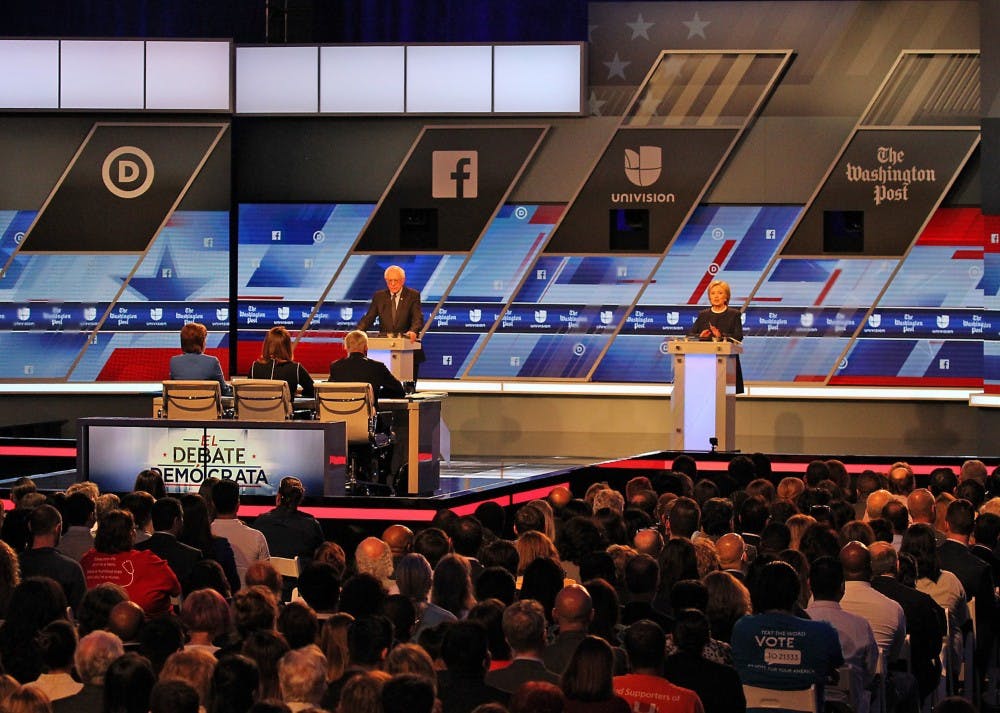Nick Siano is a sophomore telecommunications and journalism major and writes "Nick and Tired" for the Daily News. His views do not necessarily agree with those of the newspaper. Write to Nick at ncsiano@bsu.edu.
Very quickly, I realized this debate would stand out from the last eight we’ve had so far. I had to lower the volume considerably because Bernie Sanders and Hillary Clinton were yelling at me in surround sound within three minutes of the first question. Both Democratic contenders pulled the gloves off for this debate, but as their volume increased, so did the depth in which they examined the topics.
Here are my top four takeaways from the debate April 14.
1. Tax returns
Early in the debate, Clinton was asked about releasing the transcripts from her speeches at Goldman-Sachs, from which she gained $675,000. She dodged the question immediately, pulling the issue of tax returns into the debate.
“There is a long-standing expectation that everybody running release their tax returns,” she said.
She directed people to her website to view hers, because out of the entire Internet, I’m sure everyone is just dying to look up tax returns. She challenged Sanders to do the same.
Sanders mockingly said he would release the transcripts of the speeches he gave to big banks to bring Clinton back on track.
“We’ve been a little bit busy lately,” Sanders said in regards to releasing his tax returns. “But we will get them out.”
2. Minimum wage
Minimum wage was brushed upon for a few moments in the debate, and Clinton gave one of the most level-headed responses on the matter. She supports a federal minimum wage of $12, but supports cities like New York in gradually raising that wage to $15.
Sanders cited “people in this country” as saying that $12 is not enough for a living wage. He was met with thunderous applause, which outlined the problem in the debate for minimum wage: whoever promises the greater amount will sound better to people. There’s more to this than just promising numbers, even though that’s what will win an audience over.
3. U.S.-Israeli relations
 |
|---|
Loving Israel is good politics. Evangelical Christians, a sizeable chunk of Republican voters, want the United States to favor Israel in foreign policy. 64 percent of these Evangelical Republicans say this matters “a lot,” according to a December 2015 poll.
Democrats, however, have been showing less sympathy toward Israel over the past year. A study conducted by the Pew Research Center suggests that only 44 percent of Democrats express more sympathy for Israel than Palestinians.
Nonetheless, both sides of the aisle at the diplomatic level view Israel as our only viable ally in the Middle East and have no plans to sever that tie or speak poorly of their leadership. However, Sanders vouched for an “even-handed” role in bringing the people of the region together and recognizing the problems that exist among Palestinians. This was a risky move for him to take, especially in a key Democratic state, with a city that has the second-largest Jewish population outside Tel Aviv. He finished his remarks by saying, “[Benjamin] Netanyahu is not right all of the time.” I thought this was incredibly impactful, until I learned that just hours before the debate, Sanders suspended a staffer over their criticism of Netanyahu.
4. Merrick Garland and the Supreme Court
This is likely the most you’ve heard about the Supreme Court since Obergefell v. Hodges, though you might only remember that landmark case as the “same-sex marriage” case and because Snapchat gave you a bunch of filters to play with. But ever since Justice Scalia’s death in February, it has been in the news constantly, and recently, President Obama nominated Merrick Garland, the Chief Judge of the District of Columbia Circuit Court, to fill Scalia’s vacancy.
The candidates were asked if they would withdraw Garland’s nomination. Clinton supported the president. Sanders, however, would withdraw the nomination.
“I think that we need a Supreme Court justice who will make it crystal clear …that he or she will vote to overturn Citizens United,” Sanders said.
Clinton also regurgitated the last Supreme Court case she remembers from high school government and touted the importance of Roe v. Wade. This was more tangential than helpful. She heard the applause Sanders got, and just wanted some for herself, and used a stump speech to do so.
The crowd sided with Bernie, at least by volume, forcing delays and awkward pauses with their constant chanting. As nice as that support is, the New York primary is April 19, and that’s when their voices really matter





